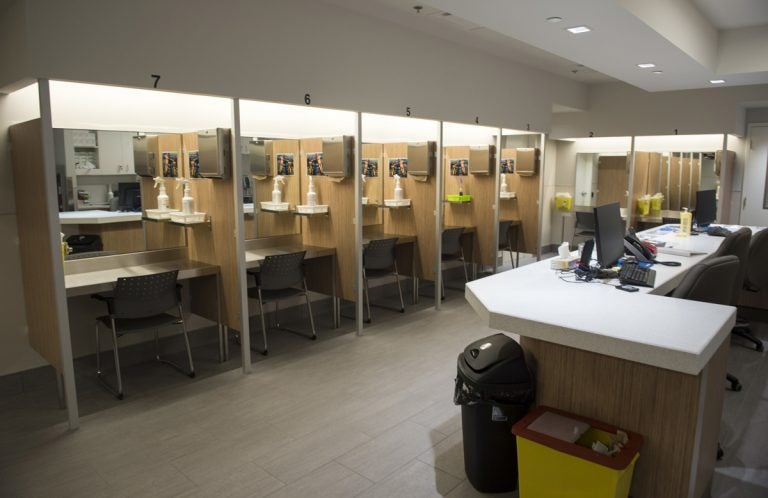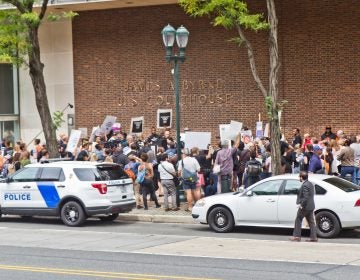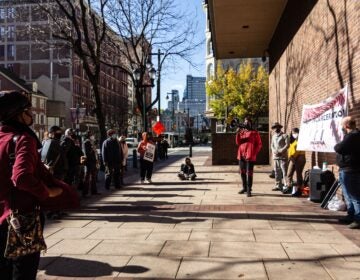Wolf’s reluctance to back Philly injection site leaves door open to U.S. crackdown
Pennsylvania governor, attorney general not ready to embrace approach to stem opioid death toll
Listen 2:09
Booths line the Cactus safe-injection site where drug addicts can shoot up using clean needles, get medical supervision, and freedom from arrest in Montreal. (Paul Chiasson/The Canadian Press via AP)
Drug overdoses, most involving opioids, killed more than 1,200 people in Philadelphia last year, making the epidemic four times as lethal as the city’s murder rate.
City officials are hoping that launching what could be the country’s first supervised injection site will save lives and, for many drug abusers, provide a bridge to treatment.
But one key area of support that might just be a bulwark against a federal crackdown is missing: backing from Pennsylvania’s attorney general and governor.
A spokesman for Gov. Tom Wolf said the proposal “presents a number of serious public health and legal concerns.” And a spokesman for Attorney General Josh Shapiro echoed that, saying changes in federal and state drug laws would have to occur before he could advocate a safe injection site.
Support from Wolf and Shapiro could be vital to the plan’s progress; state officials, specifically the governor, could administratively approve a supervised injection site through a rule aimed at protecting public health. And that might be enough for federal authorities to back away, according to Leo Beletsky, a lawyer and drug policy expert at Northeastern University.
“I think that the legal concerns, frankly, are a smokescreen for something that they see is politically inexpedient,” Beletsky said of the state officials’ reticence.
He said it’s no accident that drug law changes — such as marijuana legalization — have occurred through ballot initiatives, not by legislative or executive action. When it comes to drug policy innovation, Beletsky said, lawmakers are often “retrograde” and reluctant to buck federal law.
“The federal statute was never intended to apply to something like this,” he said, referring to the specter of federal prosecutors using drug laws to attack the type of facility Philadelphia officials are proposing. “Safe consumption facilities are not crack houses.”
Beletsky was the lead author of a paper that appeared in the American Journal of Public Health outlining ways cities and states could legally defend safe injection facilities in the face of federal drug laws that could possibly criminalize not only users at the sites, but also health workers monitoring their activity.
The best-case scenario for Seattle, San Francisco, Denver and New York and other cities now mulling safe injection facilities would be new state laws authorizing them. Such statutes, Beletsky said, would offer the “strongest footing against a challenge from the federal government.”
But if there is no political will to do that — as seems to be the case in Harrisburg — administrative action by state executives is another option to inoculate a safe injection site from federal prosecution.
The paper was published in 2008, yet Beletsky said his analysis still holds up.
“We should not be talking about this a decade later when a half million people have died in the United States, and we have tools at our disposal to address that. It’s tragic,” Beletsky said. “I am so depressed that we’re still talking about this.”
Other legal scholars describe alternative approaches for safeguarding such a facility, including passing local laws and asking the courts to enjoin the federal government from prosecuting for public health reasons.
The office of newly confirmed U.S. Attorney Bill McSwain in Philadelphia is studying the issue and will soon release a position, according to a spokeswoman. McSwain’s predecessor, however, did publicly address supervised injection sites, calling the idea “oxymoronic” and tantamount to a “self-suicide site.”
Ninety-eight supervised injection sites have opened worldwide. None operate legally in the U.S., though there have been some underground efforts.
People cannot obtain illegal drugs at the facilities, but the sites provide a place to use drugs with sterile equipment as trained health care workers — armed with the overdose-reversing drug naloxone — keep watch. Another advantage of the sites, advocates say, is the opportunity to steer drug abusers into long-term treatment programs.
One reason Pennsylvania’s attorney general and governor are not willing to endorse the idea of a supervised injection site is fear of losing law-and-order voters who may be skeptical of the government sanctioning a place for people to use illegal drugs, Beletsky said.
“It shouldn’t be that way,” he said. “Because we’re talking about a life-saving intervention.”
WHYY is your source for fact-based, in-depth journalism and information. As a nonprofit organization, we rely on financial support from readers like you. Please give today.




